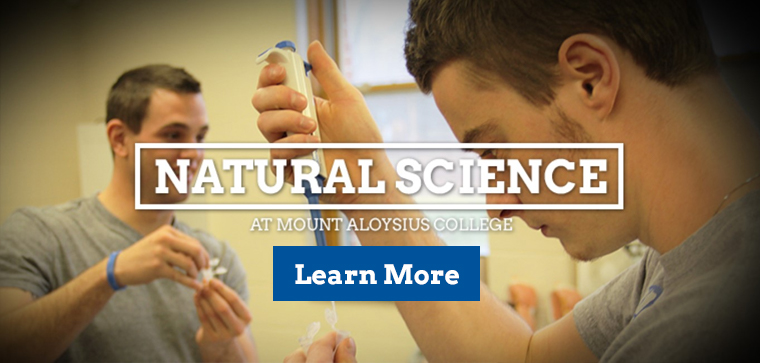|
|
|
Dec 02, 2024
|
|
2020-2021 College Catalog [ARCHIVED CATALOG]
Natural Science, Pre-Medical Laboratory Scientist, B.S.
|
|
 Return to: Academic Programs by Degree Return to: Academic Programs by Degree
|
Natural Science

Department Chairperson - Dr. J. Michael Engle
This program will prepare students to be sophisticated consumers of scientific information, to develop a general level of knowledge of the sciences, and to apply knowledge from the physical, chemical, and biological sciences to their personal and professional pursuits and as the basis for lifelong learning.
Graduates of this program will be well positioned to make informed decisions in those areas of their personal and professional lives requiring knowledge of the sciences. They will be better able to evaluate scientific elements of the issues and controversies of modern society.
By being able to view that world through the multiple lenses offered by major areas of the sciences, students in this program will have an enhanced awareness of the unity of the sciences - how insights and discoveries in one area of science influence and impact others. In conjunction with the liberal arts core, students will gain a deeper appreciation of the “grand synthesis” of intellectual pursuit - the integration and cohesiveness of the broad areas of human investigation.
The program offers preparation for future graduate work and/or entry level into the public or private sectors that have a scientific core or focus. Additionally, this program offered in conjunction with the College’s Elementary Education major will prepare students with a solid grounding in the sciences to become more knowledgeable and effective providers of instruction.
Program Goals and Outcomes
The courses required under this program in the sciences are designed to enable the student to:
- integrate and apply knowledge and experience from chemistry, physics, biology and other disciplines using analytical thinking skills, information tools and computer applications to interpret data and answer questions;
- understand the basic facts, principles, theories, methodologies and processes of science and be able to explain the differences between scientific and other ways of knowing;
- relate their scientific knowledge to both the natural and technological worlds around them, and apply those understandings to develop informed opinions about societal issues with a scientific component;
- employ the methods used by scientists to explore natural phenomena including observation, hypothesis development, measurement and data collection, evaluation of evidence and analysis of data utilizing safe practices related to laboratory and field work;
- locate, evaluate and synthesize information on scientific topics and develop effective written and oral communication skills, including the ability to compose summaries, develop research papers or persuasive essays, and present the results of their own scientific investigations;
- demonstrate respectful communication and collaboration within groups to function cooperatively in a team setting;
- develop a set of scientific ethics and understanding of how scientific information is shared between peers in modern science, including responsible conduct for acknowledging prior and current contributions; and
- successfully pursue their career objectives in advanced education in professional and/or graduate schools, in a scientific career in government or industry, in a teaching career in the school systems, or in a related career following graduation.
Requirements for Admission
- Completion of high school coursework in biology, chemistry, and algebra with a “C” or better.
Some articulation programs require a specific SAT score for early admission. Students interested in such programs should contact the department chair for more information on the program they seek to pursue.
Students must select one of the following specialization:
- Natural Science Specialization
- Pre-Chiropractic Specialization
- Pre-Medical Laboratory Scientist Specialization
- Pre-Physical Therapy Specialization
- Physical Therapy Assistant/Natural Science with a Pre-Physical Therapy Specialization (2+2) Option
- Pre-Physician Assistant Specialization
Core Course Requirements
Upper-Division Literature
Art/English/Music/Theatre
- ART, ENGL, MUSC, THEA 3 Credits
History/Political Science
Information Communication Technologies
Religious Studies/Philosophy
- RLST or PHIL 3 Credits
and
- RLST 300/400 3 Credits
Social Science
- CRIM, ECON, GEOG, PSYC, SOCI, WGST 6 Credits
Cultural Diversity
- Cultural Diversity: 3 Credits
Integrated Discipline Capping
Total Credits in Core: 46 Credits
Major Course Requirements
Total Credits in Major: 31 Credits
(Includes 10 credits in the core)
Pre-Medical Laboratory Scientist Specialization
Total Credits in the Specialization:13
Total Credits in Other Required Coursework: 43
Total credits of Free Electives: 1-3 Credits
Total Credits for Degree: 120-122 Credits
2 + 2 Bachelor of General Science Degree Pre-MLS specialization option:
- Students earn the Associate Degree in Medical Laboratory Technician (MLT) and continue in a structured curriculum to earn a Bachelor Degree in General Science with a specialization in Pre-Medical Laboratory Science.
- The Medical Laboratory Technician credential gives graduates with a Bachelor Degree in General Science a defined career path with opportunity for advancement that includes eligibility to sit for the American Society for Clinical Pathology (ASCP) Medical Laboratory Scientist (MLS) certification with ASCP Medical Laboratory Technician certification and two years of full time clinical laboratory experience as a MLT generalist in an accredited laboratory.
|
 Return to: Academic Programs by Degree Return to: Academic Programs by Degree
|
|
|
Stay Connected!